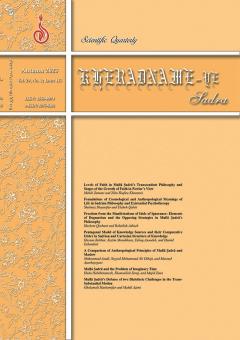A Comparison of Anthropological Principles of Mullā Ṣadrā and Maslow
Subject Areas : Studies on Mulla Sadra and the Transcendent PhilosophyMohammad Azadi 1 , Seyyed Mohammadali Dibaji 2 , Masoud Azarbaijani 3
1 - PhD candidate of Philosophy and Kalam, College of Farabi, University of Tehran, Qom, Iran
2 - Associate Professor, Theology Department, College of Farabi, University of Tehran, Qom, Iran
3 - Professor at the Research Institute of Hawzeh and University, Qom, Iran
Keywords: Man, anthropology, Humanism, perfectionism, Transcendent Philosophy, Mullā Ṣadrā, Maslow,
Abstract :
Maslow, as a humanist psychologist, and Mullā Ṣadrā, as one of the greatest thinkers of Islamic tradition, have provided different views regarding the whatness of human beings. Given the fact that both thinkers have paid particular attention to explaining the required features and pre-requisites for Man’s perfection itself and the process of Man’s perfection as well as the characteristics of perfect Man, a comparison of their anthropological principles can yield some valuable results. Some of the shared principles of these two philosophers’ include enjoying essential dignity; free will; the ability to move towards perfection, and pre-mordial nature and accepting spiritual experiences and the infinity of the process of Man’s perfection. However, they have provided various interpretations of these principles. Moreover, they have different views regarding the centrality of God in Man’s life, existential dimensions, fundamental needs, stages of Man’s growth, end of Man’s perfection, and characteristics of Perfect Man. Mullā Ṣadrā has managed to present a system based on cognitive principles through benefitting from religious, gnostic, and philosophical fundamental rules, synthesizing them with each other, and introducing a comprehensive and consistent portray of Man’s truth. An all-inclusive and meticulous analysis of such principles can be of great value to related discussions in modern philosophy. A synthesis of gnosis, religion, and reasoning is one of the most important features of Mullā Ṣadrā’s philosophical thoughts, which affect all the acceptable elements of Man’s Whatness.
آذربایجانی، مسعود (1399) فلسفه علم روانشناسی، تهران: سمت.
آشتیانی، سیدجلالالدین (1381) شرح بر زاد المسافر، قم: بوستان کتاب.
ابنسینا (1379) النجاة من الغرق فی بحر الضلالات، تحقیق محمدتقی دانشپژوه، تهران: دانشگاه تهران.
اتکینسون، ریتا؛ اتیکسون، ریچارد؛ هیلگارد، ارنست (1383) زمینه روانشناسی هیلگارد، ترجمه محمدنقی براهنی، تهران: رشد.
بونژه، ماریو؛ آردیلا، روبن (1399) فلسفه روان¬شناسی، ترجمه محمدجواد زارعان و همکاران، قم: پژوهشگاه حوزه و دانشگاه.
جوادی آملی، عبدالله (1375) فلسفه حقوق بشر، قم: اسراء.
جوادی آملی، عبدالله (1379) صورت و سیرت انسان در قرآن، قم: اسراء.
جوادی آملی، عبدالله (1393) رحیق مختوم، ج1، قم: اسراء.
جوادی آملی، عبدالله (1398) رحیق مختوم، ج31، قم: اسراء.
جوادی آملی، عبدالله (1400) رحیق مختوم، ج32، قم: اسراء.
شکرکن، حسین؛ برادران رفیعی، علیمحمد؛ منتظری، علی؛ غروی، سیدمحمد (1372) مکتب¬های روانشناسی و نقد آن، ج1، تهران: سمت.
شولتس، دوآن (1394) تاریخ روانشناسی نوین، ترجمه علیاکبر سیف، حسن¬پاشا شریفی، خدیجه علی¬آبادی و جعفر نجفی زند، تهران: دوران.
شولتس، دوآن (1395) روانشناسی کمال، ترجمۀ گیتی خوشدل، تهران: پیکان.
عبودیت، عبدالرسول (1392) درآمدی به نظام حکمت صدرایی، ج3: انسان¬شناسی، تهران: سمت.
کلینی، محمد بن یعقوب (1407ق) الکافی، بیروت: دار إحياء التراث العربي.
لاندین، رابرت ویلیام (1395) نظریه¬ها و نظامهای روان¬شناسی، ترجمه یحیی سیدمحمدی، تهران: ویرایش.
مدرس طهرانی، آقاعلی (1378) مجموعه مصنفات، تهران: اطلاعات.
مزلو، آبراهام (1374) انگیزش و شخصیت، ترجمۀ احمد رضوانی، مشهد: آستان قدس رضوی.
مزلو، آبراهام (1397) ادیان، ارزشها و تجربه¬های اوج، ترجمۀ زهرا اکبری، تهران: کرگدن.
ملاصدرا (1378) المظاهر الإلهیة فی أسرار العلوم الكمالیة، تصحیح و تحقیق سیدمحمد خامنهای، تهران: بنیاد حکمت اسلامی صدرا.
ملاصدرا (1381الف) الحکمة المتعالیة فی الأسفار الأربعة، ج6، تصحیح و تحقیق احمد احمدی، تهران: بنیاد حکمت اسلامی صدرا.
ملاصدرا (1381) المبدأ و المعاد، تصحیح و تحقیق محمد ذبیحی و جعفرشاهنظری، تهران، بنیاد حکمت اسلامی صدرا.
ملاصدرا (1382) الشواهد الربوبية فی المناهج السلوكية، تصحیح و تحقیق سیدمصطفی محقق داماد، تهران: بنیاد حکمت اسلامی صدرا.
ملاصدرا (1383الف) الحكمة المتعالية فی الأسفار الأربعة، ج1، تصحیح و تحقیق غلامرضا اعوانی، تهران: بنیاد حکمت اسلامی صدرا.
ملاصدرا (1383ب) الحکمة المتعالیة فی الأسفار الأربعة، ج8، تصحیح و تحقیق علیاکبر رشاد، تهران: بنیاد حکمت اسلامی صدرا.
ملاصدرا (1386) مفاتیح الغیب، تصحیح و تحقیق نجفقلی حبیبی، تهران: بنیاد حکمت اسلامی صدرا.
ملاصدرا (1389) تفسير القرآن الكريم، تهران: بنیاد حکمت اسلامی صدرا.
ملاصدرا (1393) شرح الهدایة الأثیریة، ج2: فی الاهیات، تصحیح و تحقیق مقصود محمدی، تهران: بنیاد حکمت اسلامی صدرا.
هرگنهان، بی. آر. (1389) تاریخ روان¬شناسی، ترجمۀ یحیی سیدمحمدی، تهران: ارسباران.
وولف، دیوید. ام. (1386) روانشناسی دین، ترجمۀ محمد دهقانی، تهران: رشد.
یزدان¬پناه، سیدیدالله (1393) مبانی و اصولی عرفان نظری، قم: مؤسسۀ امام خمینی (ره).
Maslow, A. (1968). Towards a psychology of being. Princeton: D. Van Nostrand Co.
Maslow, A. (1970). Motivation and personality. reprinted from the English Edition by Harper & Row.
Maslow, A. (1971). The Farther reaches of human nature. New York: Viking Press.
Watson, J. B. (1913). Psychology as the behaviorist views it. Psychology review, no. 20, pp. 158-177.


